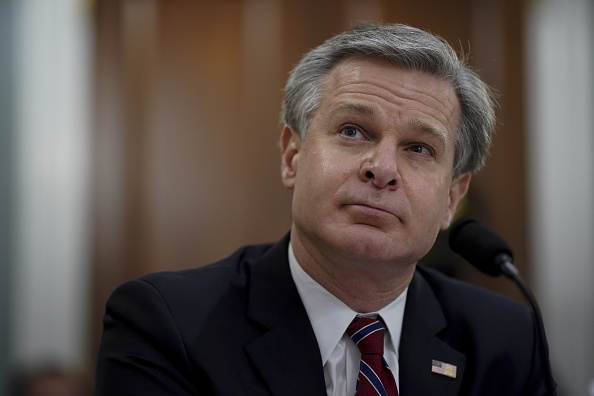FBI Director Wray likens the White House's urgency to address ransomware attacks to post-9/11 alarm


A free daily email with the biggest news stories of the day – and the best features from TheWeek.com
You are now subscribed
Your newsletter sign-up was successful
The White House is treating the spate of major ransomware attacks this year as a threat to national security, with FBI Director Christopher Wray comparing the government's newfound urgency to its rush to combat international terrorism after 9/11. "There are a lot of parallels, there's a lot of importance, and a lot of focus by us on disruption and prevention," Wray told The Wall Street Journal on Thursday. "There's a shared responsibility, not just across government agencies but across the private sector and even the average American."
Ransomware attacks, which typically use malicious software to seize and lock up a company's data until a ransom is paid, aren't carried out by governments but rather by criminal organizations; as a result, up to this point, such cases have primarily been treated as mostly criminal concerns. But while the FBI formerly approached ransomware attacks with the end-goal of prosecution — a rare outcome, however, because most of the hackers live in places like Russia, where they're sheltered from U.S. law — the new approach will involve "using intelligence agencies to spy on foreign criminals and contemplating offensive cyber operations against hackers inside Russia," officials told NBC News.
Earlier this year, a ransomware attack on Colonial Pipeline led to panic buying and gas shortages in the Southeast. Another attack resulted in thousands of confidential documents from the Washington, D.C. Metropolitan Police Department leaking onto the dark web. Then again this week, a ransomware attack targeted Brazil's JBS, the world's largest meat processor, causing plants to shut down and threatening worldwide meat shortages. The U.S. almost immediately blamed Russia for the JBS attack, which NBC adds is " extremely unusual," because the White House rarely will "publicly call out a foreign adversary over a single ransomware attack."
The Week
Escape your echo chamber. Get the facts behind the news, plus analysis from multiple perspectives.

Sign up for The Week's Free Newsletters
From our morning news briefing to a weekly Good News Newsletter, get the best of The Week delivered directly to your inbox.
From our morning news briefing to a weekly Good News Newsletter, get the best of The Week delivered directly to your inbox.
Americans are "now realizing [ransomware attackers] can affect them when they're buying gas at the pump or buying a hamburger — I think there's a growing awareness now of just how much we're all in this fight together," Wray said.
A free daily email with the biggest news stories of the day – and the best features from TheWeek.com
Jeva Lange was the executive editor at TheWeek.com. She formerly served as The Week's deputy editor and culture critic. She is also a contributor to Screen Slate, and her writing has appeared in The New York Daily News, The Awl, Vice, and Gothamist, among other publications. Jeva lives in New York City. Follow her on Twitter.
-
 How to Get to Heaven from Belfast: a ‘highly entertaining ride’
How to Get to Heaven from Belfast: a ‘highly entertaining ride’The Week Recommends Mystery-comedy from the creator of Derry Girls should be ‘your new binge-watch’
-
 The 8 best TV shows of the 1960s
The 8 best TV shows of the 1960sThe standout shows of this decade take viewers from outer space to the Wild West
-
 Microdramas are booming
Microdramas are boomingUnder the radar Scroll to watch a whole movie
-
 Australia’s teen social media ban takes effect
Australia’s teen social media ban takes effectSpeed Read Kids under age 16 are now barred from platforms including YouTube, TikTok, Instagram, Facebook, Snapchat and Reddit
-
 Why Britain is struggling to stop the ransomware cyberattacks
Why Britain is struggling to stop the ransomware cyberattacksThe Explainer New business models have greatly lowered barriers to entry for criminal hackers
-
 Who are the new-wave hackers bringing the world to a halt?
Who are the new-wave hackers bringing the world to a halt?The Explainer Individual groups and nations are beginning to form concerning partnerships with new ways to commit cybercrime
-
 Jaguar Land Rover’s cyber bailout
Jaguar Land Rover’s cyber bailoutTalking Point Should the government do more to protect business from the ‘cyber shockwave’?
-
 Google avoids the worst in antitrust ruling
Google avoids the worst in antitrust rulingSpeed Read A federal judge rejected the government's request to break up Google
-
 Supreme Court allows social media age check law
Supreme Court allows social media age check lawSpeed Read The court refused to intervene in a decision that affirmed a Mississippi law requiring social media users to verify their ages
-
 Nvidia hits $4 trillion milestone
Nvidia hits $4 trillion milestoneSpeed Read The success of the chipmaker has been buoyed by demand for artificial intelligence
-
 X CEO Yaccarino quits after two years
X CEO Yaccarino quits after two yearsSpeed Read Elon Musk hired Linda Yaccarino to run X in 2023
